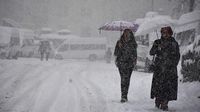As weather conditions shift dramatically across Turkey, residents are bracing themselves for unpredictable weather patterns. On March 20, 2025, the country's eastern regions will particularly be facing a variety of harsh weather events, as indicated by the Meteorology General Directorate.
Unlike the somewhat warmer temperatures experienced in recent days, a stark drop in temperatures is expected. In Istanbul, the anticipated temperature ranges between 4 and 7 degrees Celsius, averaging at 6 degrees. However, the chill is exacerbated by wind gusts which are projected to reach speeds of 40-70 km/h, especially in the northern regions.
In Istanbul, locals can expect rainfall starting in the night hours, with weather conditions disrupting daily life. Furthermore, major areas such as Silivri, Çatalca, Sultangazi, Başakşehir, and Hadımköy have already begun experiencing snowfall. Collectively, these areas face a potential of heavy precipitation mixed with rain and snow, particularly along the Mediterranean coasts.
According to the Meteorology General Directorate, warnings have been issued for 48 provinces, highlighting the severity of the impending weather events. For instance, in the eastern parts of Marmara and throughout Southeastern Anatolia, forecasts predict strong rains, accompanied by occasional thunderstorms that could pose risks to residents. The Director’s yellow alerts cover regions including parts of Central Anatolia, the Eastern Black Sea, and Southeastern Anatolia, warning that heavy rains will likely result in flash floods and potential damage to infrastructure.
Rainfall is expected to intensify in the Eastern Mediterranean and parts of Central Anatolia. Strong winds could lead to the possibility of avalanches in the eastern mountain regions, compelling authorities to urge residents to take necessary precautions, particularly in the steep and snowy slopes of Eastern Anatolia.
This shift to colder weather has elicited reactions from residents who are now adapting to the unpredictability of the weather. One resident observed, “One moment it's sunny, and the next, you’re covered in snow.” This fluctuation has prompted practical adjustments in daily life, from clothing choices to transportation schedules.
As for the forecast for March 20, specifically, a considerable degree of fluctuation is expected. For instance, while the capital Ankara is expected to see a high of just 4 degrees Celsius with intermittent snow showers, Istanbul will experience similar grey skies and rain through the night.
In the Aegean region, local meteorological services report that conditions will remain predominantly cloudy, with expected light snowfall in the Kütahya and Afyonkarahisar areas, as residents tackle the winter-like sensations in March already.
In the Inland Anatolia region, temperatures are forecast to settle around freezing, with a high of 4 degrees Celsius. Various weather warnings are notably prevalent, with potential icy conditions during nights that could complicate travel plans.
Meanwhile, areas like Bolu have already reported accumulating snow, leading local authorities to suspend education due to hazardous travel conditions on March 19. Following the heavy snow, the Bolu district announced, “Education is suspended after noon due to the ongoing snowstorm.
The southern provinces aren’t being spared either, as thunderous showers, particularly in Adana, will accompany high winds. Here, rainfall is projected to occur intermittently with possible thunderstorms expected to exacerbate already damp conditions.
This weather turn has seemingly caught many off-guard, leading some experts to comment on the unusual timing of this weather shift. One meteorologist noted that this is a “cold wave that shows how quickly weather patterns can change,” as the country’s typical March conditions, which are usually milder, have suddenly given way to an extended cold spell.
As the cold wave sets in, authorities are enforcing careful preparations, especially for residents living in higher altitude areas prone to avalanches. Indeed, precautions against potential frost and icing are being heavily urged for lower-lying areas as well.
Residents are being encouraged to heed meteorological reports and local advisories to ensure safety throughout the period of unpredictable weather. The Director General emphasized the significance of being prepared for natural circumstances that can quickly evolve.
The future remains uncertain as to how long this cold spell will last, but indications suggest that residents should brace for a mixture of snow, rain, and possible flooding in various regions. Observers remain optimistic, hoping that warmer weather will soon replace the bitter cold after this unprecedented duration of winter conditions late into March.









